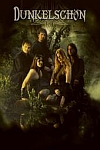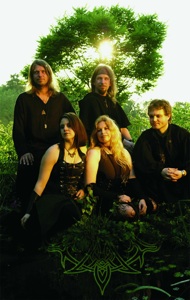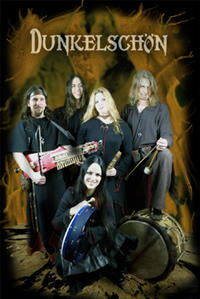 Interview with
Interview withMichael Kaiser (vocals, guitar, harp, shawm and several more instruments) and Vanessa Istvan (vocals, flutes) of Dunkelschön
When you first get to know about DUNKELSCHÖN, you immediately get the impression of just another band musically stuck in the Middle Ages. However, you will soon notice that DUNKELSCHÖN are somehow different and have a completely own musical vision. For example they aren’t afraid to include modern elements in their music, clearly choose variety over monotony, prefer playing amplified shows over acoustic performances at medieval fairs, and also partly come from a punk and heavy metal background. Read below what else they have to say...
Reflections of Darkness (RoD): Hello you two! Thank you very much for taking the time to answer some questions. First of all I’d like to talk with you about your band name. DUNKELSCHÖN (Dunkel = dark; schön = beautiful) - does your name already say it all? Is your music just “beautiful” but also filled with some darker or gloomier moments, or what does the word DUNKELSCHÖN mean to you?
Michael: The name DUNKELSCHÖN just happened accidentally. When we recorded our first self-produced CD ‘Schattentanz’ (even before the actual formation of the band), there was this one line in a song which goes like that: “…Leuchtend hell und dunkelschön und schneller als der Wind…” (“…Shining bright and ‘dunkelschön’ and faster than the wind…”). One day, when I heard this track on my way to work, I just knew: This must become our band name! But yeah, I think the name already quite says it all at, even though our music is very versatile.
RoD: You are six members who all play the most different instruments, both live and in studio. For example there is a clash between modern elements (such as the drums) and traditional medieval instruments such as various flutes. Do you like that clash of tradition and modernity, and does this give you more space for development?
Vanessa: Definitely! It is just great to see what kind of things can emerge if you
 don’t only focus on authenticity. And these different instruments can be combined with each other in many possible timbres - and the result is always something really special.
don’t only focus on authenticity. And these different instruments can be combined with each other in many possible timbres - and the result is always something really special. RoD: In general, how important is the interplay between the different instruments and what kind of an impact does this instrumental diversity has on the musical direction of DUNKELSCHÖN?
Vanessa: Since we are not only multifaceted in our musical endeavours, but also in our own listening habits, we really love to bring some kind of diversion into our releases. This goal can be achieved through our multifarious equipment. A harp, for example, is predestined for the creation of a romantic tone, a hurdy-gurdy introduces the medieval feeling, and a nyckelharpa can be of great use if you want to create a rockier theme. Therefore we always have the best tools at hand for the many song ideas that we have.
RoD: I’d like to know if you all have a similar musical background, or if you all come from different musical directions? How did you come together at first place?
Michael: I honestly think our roots could not have been any more different: In addition to musical “philistines” like me (who can’t even read music), we have band mates that are professionals to the core, such as Moni, a stage cellist with a degree in music, or Nicolas, our new guitarist who had won the contest “Jugend musiziert” many times in his youth. Our musical influences are also quite different: We have everything from punk over heavy metal to classical stuff. Nevertheless - and that’s what I find striking - we can all find a common denominator and are able to combine all these diverse influences in our music.
RoD: You two already play a lot of instruments. Vanessa, you not only sing, but you also play different kinds of flutes. Michael, you can also resort to a grand repertory of different instruments. What was your first instrument, and when did you start playing? And how did this diversity of instruments eventually come about?
Michael: Since I was born into a full-blooded musical family, it was just a question of time until I started learning an instrument. This already happened when I was six years old. Back then I discovered a snare drum in my parents’ closet and started to play regularly. But in order to give the whole thing a certain sense (and in order to prevent it from simply being a pain in the ass for my parents), I got lessons early on. At an age of twelve I got sick of drumming and started teaching myself how to play the guitar. This gave me the first opportunity to create own songs. In the course of time, I got to know more and more new fascinating instruments, and when I had the opportunity to pick up a new instrument, it was my own motivation to be able to play it as soon as possible.
Vanessa: My story is similar to Michael’s. I loved to sing fervently from an early age - mainly in the stairway because of the great echo. My mother told me that I could whistle before I could speak. Well, I guess this ability has further developed in some way. I also got music lessons pretty early, and started singing in a choir, etc. When it comes to the flutes, things were quite simple… I always say: “If you can play one of them, you can play all!” Okay, maybe the handling is a bit different because sometimes you need more or less respiration but in some way they are all alike.
RoD: Let’s talk about your new fourth album ‘Katharsis’ (“catharsis”) which is due on September 11th. The word “Katharsis” derives from the Ancient Greek and generally describes an emotional, physical, mental, and also religious cleaning. Do you want to achieve this kind of “cleaning of the soul” with your music and with the listener passing through various moods, or does the title rather describe a lyrical or contextual concept?
Vanessa: I would say: Both. The ancient term “Katharsis” was first coined by Aristotle. It describes the process of “cleaning the soul”. By living through different feelings induced by art, one is “cleared” off his emotions. I guess everyone knows the liberating feeling after having seen a wonderful theatre performance, or after having watched a great movie or after finishing a book. One can also find a state of catharsis in music. And just like we have these various states of mind, music can also be just as diversified. Therefore we have chosen the title ‘Katharsis’ for our album, since it contains a lot of different dark and beautiful (“dunkelschöne”) sounds.
RoD: What is the meaning of the words or names Haganusa, Aeris, Askath, Mion Mar, and Lacrima that appear in the album? Do you want to create a completely new world in the listeners’ minds, and basically tell the listener an own story?
 Vanessa: “Aeris” and “Lacrima” are actually Latin words. “Lacrima” means “tear” (in this song, it is more meant as a tear of joy), and “Aeris” is a variation of the word “air” that we found appropriate for that light, airy song at the end of the CD wherein the wind also plays the harp. “Askath” and “Mion Mar,” however, are made-up onomatopoetic words that shall help to emphasize the melody of the respective songs. I think we only have little influence on the kind of image that the listener creates in his mind while listening to our songs because everyone creates this for himself, by means of his own current mood or state of mind.
Vanessa: “Aeris” and “Lacrima” are actually Latin words. “Lacrima” means “tear” (in this song, it is more meant as a tear of joy), and “Aeris” is a variation of the word “air” that we found appropriate for that light, airy song at the end of the CD wherein the wind also plays the harp. “Askath” and “Mion Mar,” however, are made-up onomatopoetic words that shall help to emphasize the melody of the respective songs. I think we only have little influence on the kind of image that the listener creates in his mind while listening to our songs because everyone creates this for himself, by means of his own current mood or state of mind.RoD: Speaking of onomatopoetic elements: In songs like ‘Mion Mar’ you use a fictional language or words that differ greatly from German but nevertheless suit the music well. Can you tell me more about it?
Michael: The lyrics of ‘Mion Mar’ are made up of the most different fragments: When the chorus of the song crossed my mind last year while I was driving my car, I also immediately had these made-up words in my mind that accompanied the melody. Later, when we were already working on the new album, I remembered that occurrence and noticed that the chorus would really go well with an ancient Celtic-Gaelic magic spell from the King Arthur saga. Nevertheless the whole thing also had a quite oriental feel to me and so it happened during a walk in the wood that I got the idea to combine the existing fragments with a hurdy-gurdy theme that we had already played before. At last, Nicolas’ bouzouki solo finally made the song complete.
RoD: How do you think you have evolved as a band in comparison to the previous releases? What is different now? Are you maybe using more instruments than before, or did you apply new, fresh working methods?
Vanessa: Since we are very satisfied with our last two albums, it wasn’t really our goal to further develop to another point. Nevertheless it happened that we could open up new possibilities for ourselves and profit from it. For example the virtuous playing of our new band mates (Monika Klüpfel, Nicolas von Stolz and André Straub) gave us the opportunity to tread on completely new ways, and it brought in some new musical elements that couldn’t have been realized before.
RoD: What amount of time do you usually need for the preparation and production of an album? How do you typically create a song?
Michael: So far it always took us about six or seven months until we were done with the recording. However, this time it took us the longest from the first rough idea until the release date. And we really think it was worth it! The songs mostly arise from an idea for a melody that me or Vanessa have, and if it happens to get stuck in our minds, we are working to create a song around it.
RoD: Is it important for you to create your own songs and concepts, or do you also base some songs on already existent poems, scripts, or ancient stories, like many bands in the medieval genre do?
Michael: When it comes to our music, it is very important for us to develop our own ideas. After all, we are musicians and not poets. Of course we also have lyrical ideas from time to time that can in a way be described as “poetic.” But this aspect is not that important for us. The main thing is the music!
RoD: Much to my astonishment, I read that you played on a medieval fair in Ingelheim not too long ago. This is of particular interest for me since I have lived in Ingelheim my whole life, and of course I had also heard of the medieval fair. How did you like it there, and what were your impressions? I mean, it was a rather small fair, and Ingelheim is also not that much of a big or well-known town. Do you think this lead to a more intimate atmosphere?
Michael: I actually thought the medieval fair in Ingelheim wasn’t that small!
 Everything was well-organized and very spacious. Our performances were well-attended and I think the two days that we spent there were a great success. Ingelheim is in general a really beautiful town (except for our hotel rooms that didn’t even have windows) and with very famous historical persons such as Johanna von Ingelheim (who even became a popess in the 9th century); it is also a town that is very rich of history. Therefore we really enjoyed our performances in the old quarter of the town where she must have lived back then.
Everything was well-organized and very spacious. Our performances were well-attended and I think the two days that we spent there were a great success. Ingelheim is in general a really beautiful town (except for our hotel rooms that didn’t even have windows) and with very famous historical persons such as Johanna von Ingelheim (who even became a popess in the 9th century); it is also a town that is very rich of history. Therefore we really enjoyed our performances in the old quarter of the town where she must have lived back then. RoD: How do you like performances at medieval fairs in general? Of course your music really fits to these events, and I’m sure it can perfectly contribute to the atmosphere and feeling of these fairs. In what kind of way are these performances different from other concerts?
Michael: Our main focus is not on medieval fairs, to be honest, but rather on amplified concerts. On medieval fairs, one usually performs in a minstrel kind of way, and there is a high importance on authenticity. Of course we have done this a lot in the past, but at some point you have kind of grown out of it. Our music has evolved a lot since these times where we played at a lot of medieval fairs, and now it definitely comes more into its own on amplified stages where we can make use of our full equipment and also add the drums to our line-up. And it is also the place where we can best realize the sound that our listeners are familiar with from our albums. Here lies the difference: If we only played acoustic performances on medieval fairs, we would have to leave half of our line-up at home and therefore would only play on a low flame. I think this would be a real pity and the listeners would miss out on a lot!
RoD: I’ve seen that you also play in folk clubs, met bars, at festivals, and even in churches. Do you like this diversity? And what has been your best show so far?
Michael: It’s very hard to say which shows have been the best so far because there have been a lot of great ones. And this is definitely not constrained by location aspects. It doesn’t matter if the show took place on an 11x18 m stage or if we played in a small, intimate folk club. The atmosphere and the affection of the crowd is most important. Even the smallest show in a theatre-style seating arrangement can be a blast if the audience is really taken by our music.
RoD: Coming back to your “tools”: Isn’t it quite hard to take all of these instruments with you to live gigs, or do you have a fixed repertory of instruments for your shows?
Michael: Yeah, this can in fact be hard! We take along everything for our performances, and along with the merch and the stage decoration this always loads up a big transporter and another separate car. In my next life I’m gonna be a member of a flute trio!
RoD: To conclude this interview, I’d like to know what stuff you are listening to in your spare time, and where you find your inspirations apart from the music?
Michael: Regarding our personal music taste, you would be surprised to see what we are all listening to. For me, the most important thing in music is that it is well-made. This goes for the ideas as well as for the arrangement and the realization. On that score, one can find good stuff in basically all genres. And you can find inspiration everywhere, just by looking at the world with open eyes!
RoD: Thank you very much for the interview, and I wish you the best of luck for your new album!
{jos_sb_discuss:21}






Comments powered by CComment